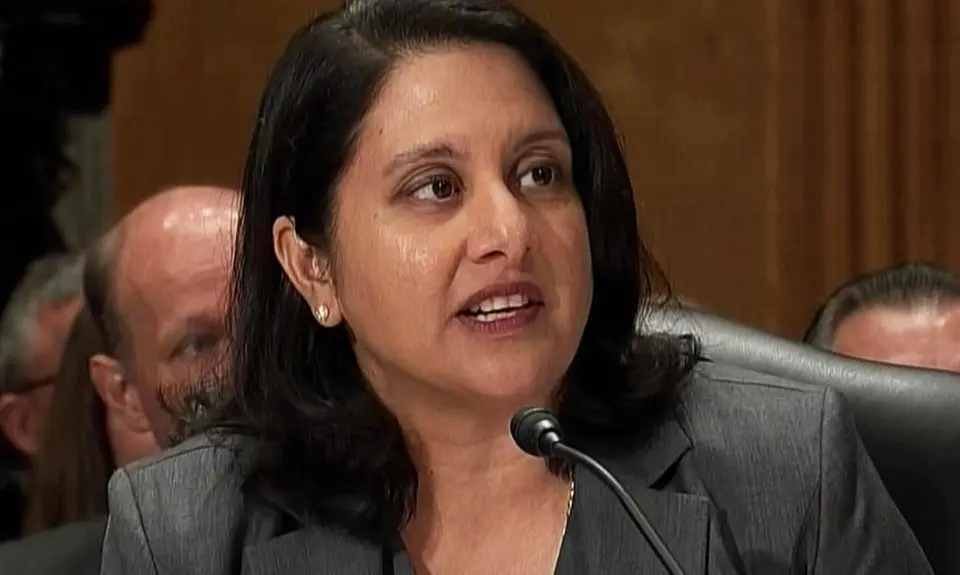“Confirmed Judges, Confirmed Fears” is a blog series documenting the harmful impact of President Trump’s judges on Americans’ rights and liberties. Cases in the series can be found by issue and by judge at this link.
Trump D.C. Circuit judge Neomi Rao wrote a decision that vacated a National Labor Relations Board (NLRB) ruling against a company for threatening a unionized employee and interfering with his right to union representation. The June 2020 case is Circus Circus Casinos Inc. v. NLRB.
In September 2013, Circus Circus, a Las Vegas, Nevada, hotel and casino, hired Michael Schramm on a temporary basis as a carpenter in its engineering department to help with security upgrades in its guest rooms. A few months later, at a meeting with department head Rafe Cordell, Schramm and an engineer named Fred Tenney raised a concern that secondhand exposure to marijuana smoke in guest rooms could cause employees to test positive for drugs. Cordell assured them that secondhand exposure would not produce a positive result, but Schramm was not satisfied with his general assurances. According to Tenney and Schramm, Cordell became angry and abruptly ended the meeting by telling Schramm, “Maybe we just won’t need you anymore.”
Several weeks later, when Schramm arrived for a required medical exam, he asked to see a doctor before filling out paperwork to take the exam, but his request was refused, and he went back to work.
After learning of the incident, Cordell suspended him, and the hotel began an investigation into his refusal to take the exam. As suggested by Circus’ human resources staff, Schramm tried several times to contact a representative from the carpenters union that represented him to accompany him at an investigative meeting, but could not successfully reach anyone. He told human resources officials at the meeting that he had tried “three times” to contact the union, and that he was there “without representation,” but the officials continued the meeting anyway. Later that month, Cordell and other officials met with Schramm, who attended with a union representative, and fired him for insubordination.
Schramm filed charges of unfair labor practices with the NLRB. After a hearing before an administrative law judge (ALJ), the NLRB accepted the ALJ’s recommendation and found that Circus violated the National Labor Relations Act by Cordell threatening Schramm at a meeting and thus discouraging employees from voicing concerns about working conditions, continuing the investigative meeting despite Schramm’s lack of union representation, and firing Schramm, in part because he had engaged in protected workplace activity.
Circus sought review of the decision in the D.C. Circuit. All three judges agreed that the case should be remanded for more fact-finding on a separate issue that had been raised around the firing, but in a 2-1 decision, Judge Rao vacated the NLRB order and threw out its other findings of unfair labor practices. She maintained that Schramm had not specifically asked officials for union representation at the meeting, and thus did not trigger his rights to such representation. With respect to Cordell’s threat against Schramm, Rao concluded that the ALJ and the NLRB were wrong on the facts, and that the evidence Circus presented from other employees who were at the meeting that did not report Cordell’s threat should prevail. Rao concluded that the NLRB had “engaged in unreasoned decisionmaking” and “without substantial evidence on the record as a whole.”
Chief Judge Sri Srinivasan strongly dissented, pointedly noting that according to previous precedent, no “magic or special words are required” to trigger the union representation requirement. The NLRB had “reasonably held,” Srinivasan went on, that Schramm “adequately conveyed his desire for union representation.” After all, he continued, “why would Schramm relate to Circus’s representatives at the outset of the meeting that he had unsuccessfully tried to secure union representation if not because he still desired that assistance, especially given that Circus had advised Schramm to make those very efforts if he desired representation?” The majority had thus failed to make the required showing that the NLRB had “arbitrarily depart[ed]” from its precedents in making its decision.
Srinivasan also criticized Rao’s opinion for its decision to overturn the NLRB’s “factual finding” that Cordell had verbally threatened Schramm. Under the “highly deferential standard” of review of such findings, Srinivasan explained, Rao’s opinion was wrong. He pointed out that none of the witnesses Circus relied on “specifically testified about whether” Cordell had threatened Schramm, and it was not even clear whether they were “discussing the relevant meeting.” The factual determination of the ALJ and the NLRB should have been respected, Srinivasan concluded.
Unfortunately, Rao’s decision could well mean that unionized employees’ right to representation in a proceeding only applies when explicitly requested, and weakens unionized employees’ rights in favor of the employer.
